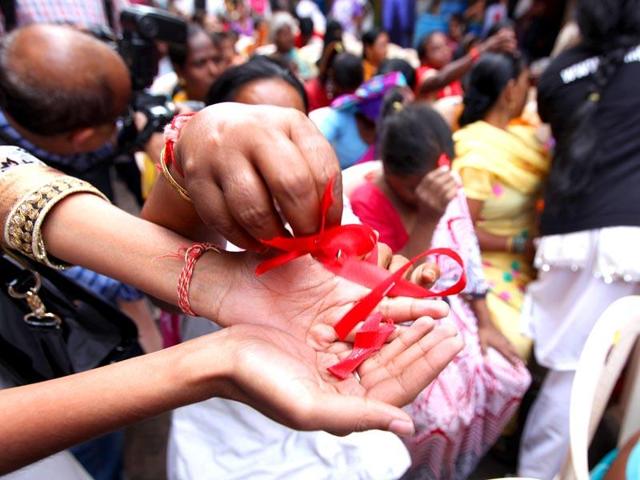The UNAIDS declaration on eradication is a half-done job
The world body must strengthen its fight against AIDS, because its victims face social stigma and are up against oppressive legal systems
The high-level meeting on AIDS, convened at the United Nations, New York, started on June 8 and virtually ended in a few hours. The Political Declaration, which was being negotiated for the past couple of months, was unanimously adopted on the first day without any discussion, leaving the large number of civil society participants and community groups in disbelief.

The 25-page declaration, which runs into 79 paragraphs, contains commitments addressing all sections of society vulnerable to HIV/AIDS, women, young people and adolescent girls, migrant populations, and poor and marginalised communities. But nowhere in the last 27 paragraphs, which contain various global targets and commitments, is there any mention of the key affected populations — sex workers and their clients, people who use drugs and the LGBT community. Evidence exists on how countries have not adequately invested in preventing new infections among these groups and how a large proportion among them are still denied access to anti-retroviral treatment (ARV) because of deep-rooted stigma and oppressive legal systems.
Read: Muslim nations block gay groups from UNAIDS conference
The reasons for this are not difficult to seek. The UN system operates on the principle of consensus and has to accommodate conflicting policies and cultures to arrive at a commonly acceptable position on issues. It is quite clear that some countries in West Asia, and East and Central Asia are generally opposed to prevention efforts aimed at sex workers, gay men and people who use drugs. These two regions still see sharply increasing rates of new infections among these very populations who are criminalised and stigmatised by national laws, policies and practices. In hammering out a draft resolution acceptable to divergent shades of political opinion, the co-facilitators of the meeting had to accommodate every aspect of AIDS response into it. In the process, the sharp focus that is needed on prioritising prevention, treatment and care for the key affected populations is missing in the Declaration.
Read: UN chief calls for end of AIDS by 2020
Even in countries that have been able to report a drastic reduction of new infections, evidence has shown rising rates of new infections among sex workers, people who inject drugs, and the LGBT communities. This is true even in the hyper-epidemic countries of sub-Saharan Africa. Global public opinion has, therefore, been looking for a strong resolution sharply focusing on the main issues and how they should be prioritised for the next five years to achieve the ambitious targets set for 2020.
Read: Work on inequalities to get rid of AIDS: UN
On the positive side, the Declaration has successfully set quantitative targets the world community has pledged to fulfil by 2020 and later by 2030. These relate to committing financial resources for treatment programmes to fulfil the 90-90-90 targets (by the year 2020, 90% of HIV-infected people will get to know about the disease; 90% of them will receive “antiretroviral cure”; 90% of those receiving “antiretroviral cure will have viral suppression”), overseas development assistance to reach the agreed 0.7% of GDP for developed countries, and spending a quarter of the AIDS budgets on prevention. The commitment to put 30 million people on treatment is a commendable objective, which is expected to save the lives of 11 million people in the next 15 years, and stop a further 16.5 million people from getting infected by HIV.
The looming crisis of funding AIDS programmes because of a sharp reduction of external assistance from sources such as the Global Fund for AIDS TB and Malaria (GFATM) for middle-income countries was also identified as a challenge. Thirty-six countries that were identified as accounting for about 90% of the new infections are mostly from the middle-income group. While bio-medical interventions like treatment can be progressively integrated into general health systems, the threat of closure of prevention programmes for key populations cannot be underestimated. There is understandable anxiety among community members about the stoppage of funding from both external and domestic sources for prevention and treatment programmes targeting them. No firm assurance was forthcoming in the Declaration to clear such apprehensions.
Read: How we label a crime says a lot about our own priorities
India’s health minister, in his plenary address, made a passionate appeal for ending AIDS by 2030, and put forward a five-point action plan for achieving this objective. He assured the world body of India’s commitment to apply the TRIPs-related flexibilities for manufacturing affordable ARV generic drugs. Despite a disabling legal system, India’s national programme has managed to extend the benefits of prevention and treatment programmes to key populations in the last 15 years.
With no important world event planned for the next five years concerning HIV/AIDS and with ambitious targets set at the meeting, it is hard and determined work that lies ahead for countries to fulfil the commitments they have made at the meeting. Five years is not a long period in the global fight against AIDS but the next five will determine whether ‘Ending AIDS by 2030’ is an achievable goal or will remain a distant dream.
JVR Prasada Rao is a former Union health secretary
The views expressed here are personal



